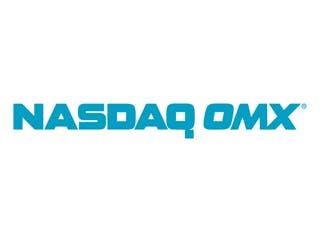
The stock exchange
Personally, I have always been fascinated by stock exchanges. More specifically, the NASDAQ OMX Group, Inc. (NASDAQ:NDAQ). The company recently acquired Swedish OMX AB, hence the name NASDAQ OMX Group, Inc. (NASDAQ:NDAQ). The NASDAQ OMX Group, Inc. (NASDAQ:NDAQ) stock exchange is the second-largest exchange in the United States.
The company’s market-making activities seem to have soured over the past quarter. This is because in a bull-market, volumes tend to dry up. The economic argument is that sellers of a good or service tend to hold back the good or service in anticipation of rising prices. Hence, we see a drop in volume in its core business of market making. But, on the upside, the company is pursuing new business opportunities and has been very aggressive about returning cash to shareholders with share buybacks and dividends.
NASDAQ OMX Group, Inc. (NASDAQ:NDAQ) earnings
The company reported market services of $553 million for the second quarter, which was down from the $587 million that was reported from the year-ago-period. The decline in revenue from market services is likely to be temporary as underwriting activity is projected to pick up; and if that’s the case, the fees earned from being an exchange operator are also like to go up.
The company reported year-over-year gains in revenue from its listing services, information services, and technology solutions. The revenue from these business units is small when compared to its listing services. The business reported year-over-year revenue gains of 7%, whereas the operating expenses increased by 16%. On a consolidated basis, the company reported that net income declined by 4.3% year-over-year. The decline in net income resulted because revenue growth could not offset the increase in expenses.
The company reported $25 million in merger-and-acquisition related expenses for the quarter, which is why net income fell on a year-over-year basis. The decline in net income is going to be temporary (the company may not necessarily acquire another company next quarter.) It reported $0.62 in diluted earnings per share (non-generally accepted accounting principles). Results fell below the expectation of analysts for the quarter as analysts were anticipating $0.64 in earnings per share.
The weakness in earnings should be temporary. Analysts currently anticipate the company to grow earnings by 12.3% per year over the next five years. The company also compensates investors with a 1.6% dividend yield.
The rating agency
Moody’s Corporation (NYSE:MCO) reported a fairly strong quarter, with revenue up by 18% year-over-year. The company was able to grow its revenue by 18% from its Moody’s Corporation (NYSE:MCO) investor- services segment, and 9% in the Moody’s Corporation (NYSE:MCO) analytics segment. The growth in the investor-services segment isn’t that surprising because the company’s rating activities are in high-demand. The company reported that its non-U.S. rating activities were up by 22%, and U.S. activities were up by 21%. The growth in non-U.S. activities is coming from projects and infrastructure activity (foreign governments).
Earnings bottom line
The company reported that expenses increased by 12%. The difference in revenue and expenses resulted in a 26% year-over-year improvement in operating income. Moody’s Corporation (NYSE:MCO) reported earnings per share of $1.00, which beat the consensus estimate set at $0.91 for the quarter.
The company was really optimistic in its outlook. It believes that earnings will grow in high single digits for 2013. The ratings agency could beat its own guidance, especially if demand for debt underwriting picks up in the second half of 2013.




